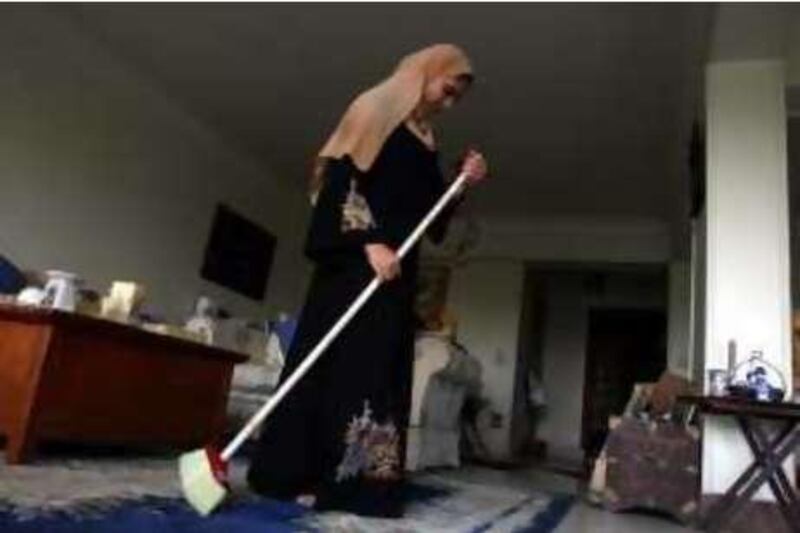CAIRO // When Rania felt she was no longer sharing a life with her husband after nearly a decade of marriage, she took a decision that is becoming more widespread in Egypt: divorce. "I started feeling as though heavy sacks of sand were pulling me down; that I've developed mentally since we got married in 1999, while he was still making comments on what I should or should not wear. At the same time, he didn't have time to discuss why I didn't want to have another baby," said Rania, 34, a saleswoman at a car company who did not want to give her second name.
Her divorce came through last year and Rania moved back in with her parents, although she shares custody of her daughter, Malak, eight, with her ex-husband. "I still feel fragile, not very stable, I don't want to get involved with the wrong man too soon," Rania said, explaining why she still wears her wedding ring. "Now, if you ask me what am I missing, I say nothing," she said. "But sometimes, I feel lonely, I miss him, he didn't mistreat me after all," she said.
Divorce is not always so straightforward in Egypt, and some women do not have the support that Rania did. For Aida el Sayed, 24, the dream of a happy marriage was shattered the morning after her wedding, when her husband beat her. She went back to work as a house cleaner, taking her six-month-old baby girl with her. She has also returned to live with relatives, although they want her to move out. "I can't afford rent, not even the baby's food or medicine," Mrs Sayed said, her eyes brimming with tears.
One third of marriages in Egypt end within the first year, according to statistics released this month by the Central Agency for Public Mobilisation and Statistics (CAPMAS). In 2006, there were over 65,000 divorces, mainly among Muslims as the Orthodox Church does not allow divorce except in cases of adultery, contagious diseases, or if one party changes religion or sect. Copts amount to around 10 per cent of Egypt's 78 million population.
In Islam, divorce is religiously permitted but is described as the most hated thing by God. The statistics also showed a drop in the number of people getting married, an alarming statistic in this conservative society where marriage is valued, sex outside marriage considered shameful, and divorce, as well as remaining single, is seen as a failure, especially for women. "Divorce is part of a disintegration ? of the moral value system of the middle class," said Nadia Halim, the manager of the Woman's Programme at the National Center for Social and Criminological Research.
Divorce is becoming so commonplace that there is now a new English magazine in Cairo called Just Divorced. Ms Halim said men and women were jumping into marriage just so they could have sex and were forgetting about the responsibilities of marriage which is what has led to a breakdown in relationships. Islam forbids sex before marriage in Egypt, but many university students have entered into secret and temporary marriages - known as urfi - just so they could have sex legally.
But for many people in Egypt, getting married is not financially viable. Inflation has rocketed to around 23 per cent this year; some 20 per cent of the workforce cannot find a job, and many people are struggling to make enough money for the basics. "In Egypt, the average cost of a wedding is equivalent to about 43 months of the entire earnings of both the groom and his father," said Navtej Dhilon, the director of the Middle East Youth Initiative at the Wolfensohn Center for Development at the Brookings Institution.
Couples who are struggling with financial difficulties are also more likely to get divorced if they do not have a strong foundation for a relationship, he said. Wael Yehia, 33, an accountant, was taken to the Family Court by his wife two years ago after he failed to provide her with a separate apartment. Mr Yehia's parents helped him marry Heba, 26, three years ago, but he could not afford to move them out of his parents home and Heba eventually insisted on a divorce.
"Most marriages won't take place if the families didn't help the couples get married," said Mr Yehia. "But because of that, they interfere in everything, even having children, which adds pressure to the already unbearable other burdens," he said. "I was dreaming of having a family with my wife; everything is gone," he said. "I feel like a zombie, so empty from inside, with no aim or hope," he said.
Since Egypt broadened its divorce laws in 2000, women can now divorce without their husband's agreement. However, if they choose this avenue, known as khula, they must give up all financial rights. The judge has the final say and there is no appeal. Men do not need to go to the courts to end a marriage. @email:nmagd@thenational.ae





